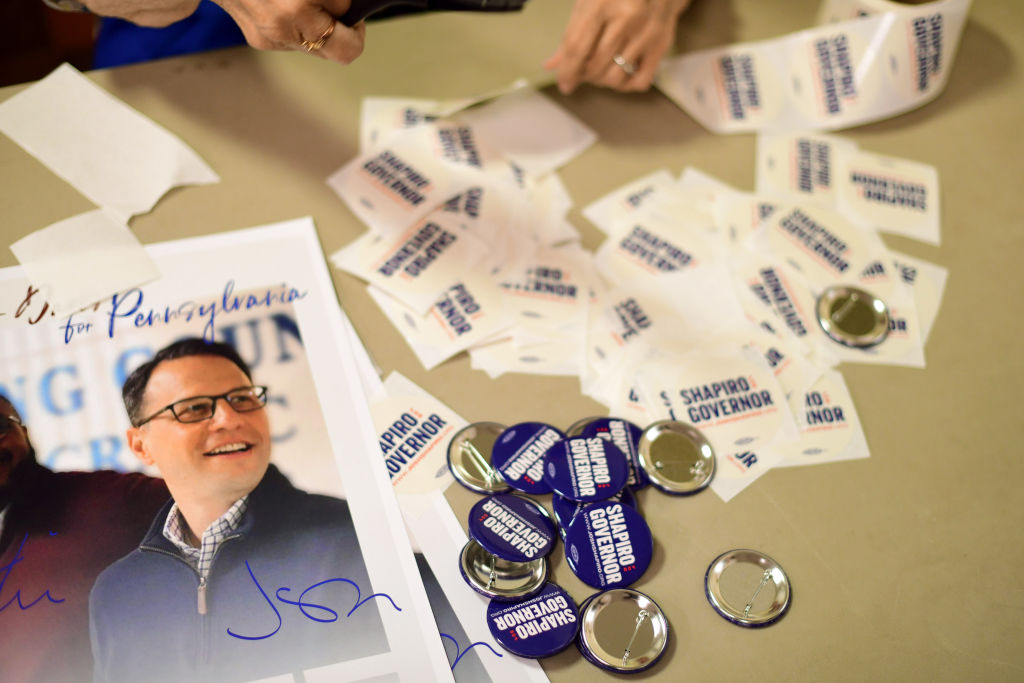The Slick
Where Pennsylvania Candidates Fetterman and Oz, Shapiro and Mastriano Stand on Climate Issues
The Democratic and Republican hopefuls diverge on most issues, though not on support of fracking.

Senate Democratic candidate John Fetterman made headlines for his support of fracking as much as for his post-stroke speech and hearing problems at his only live debate against Dr. Mehmet Oz in Harrisburg, Pennsylvania, on Oct. 25. “I’ve always supported fracking,” he said, to the shock of viewers who remember his long opposition to the controversial method for extracting natural gas.
His affirmative stance was resolute, as was Oz’s — the pair have both flip-flopped on the issue over the years, finding commonality on energy despite their opposing viewpoints in other fields.
Fetterman’s about face on fracking echoes the deliberately vague stance on the issue expressed by the Democrat running in the state’s other high-profile race, that for the governor’s seat. Vying for the role soon to be emptied by the term-limited Tom Wolf, current Attorney General Josh Shapiro faces state Sen. Doug Mastriano (R-33), who has vowed to build out the commonwealth’s natural gas sector. By comparison, Shapiro’s environmental record has won praise: His office published a damning grand jury investigation on fracking and charged several fossil fuel giants with environmental crimes — yet, when it comes to his current campaign, his stance on regulating the sector remains opaque. (None of the four candidates’ campaign teams responded to Capital & Main’s requests for comment.)
The fact that both Democrats, who boast strong environmental records, are so hard to pin down on fracking reflects the importance of the industry in the state and how politicians have handled it with delicacy.
But in the second largest natural gas producing state in the nation, climate policy is more all-encompassing than that. Below, Capital & Main compiled a rundown of all four candidates’ stances on some of the most pressing environmental issues in Pennsylvania.
GOVERNOR: SHAPIRO vs. MASTRIANO
Regulating Emissions From the Fossil Fuel Sector and the Regional Greenhouse Gas Initiative
In his time as a state senator, Doug Mastriano has vocally opposed regulations on the fossil fuel industry. Amid Pennsylvania’s attempt to enter the Regional Greenhouse Gas Initiative — a nine-state carbon trading program designed to limit emissions from the power sector while raising money for green energy — he stood firmly on the front lines of its opposition. In May, he introduced the Pennsylvania Energy Independence Act (SB 1219), a bill that would withdraw the commonwealth from the regional compact. That bill has not advanced past committee, and Pennsylvania’s entry into RGGI has been stalled by a court case filed by coal and labor groups. Should Pennsylvania successfully enter RGGI, it would be the first fossil fuel producing state in the compact. Mastriano has vowed to remove it from the accord “on day one.”
Pennsylvania is also currently wrangling over the regulation of emissions of volatile organic compounds from oil and gas wells; the state is under federal mandate to draft a rule, but that effort has faced rampant opposition from GOP legislators who have accepted funds from the oil and gas industry. The state will soon have to adopt a rule on methane when the federal EPA passes one of its own. Mastriano has not specifically taken a stance on regulating methane, but the energy plan in his policy platform states that the candidate would “lift Tom Wolf’s unreasonable regulations, taxes and fees” on the natural gas and coal industries.
Shapiro’s view on RGGI, which has become a symbol of the commonwealth’s political division on climate issues, is slightly more complicated. Per Penn Live, the Democratic gubernatorial hopeful told the Pennsylvania Chamber of Business and Industry on Oct. 3 that he would not enter the compact without legislative approval — which isn’t very supportive given that the GOP-controlled Legislature has long taken aim at RGGI. So far in his campaign he has declined to take a firm stand on the issue.
Shapiro’s stance is widely viewed as a way to distinguish himself from current Gov. Tom Wolf, for whom RGGI has become a legacy issue. The attorney general has remained skeptical of RGGI while instead backing a “comprehensive climate and energy policy” for Pennsylvania, per Bloomberg, and has, in the past, shared a draft environmental policy with local media that includes expanding clean energy and electric vehicles. He’s said he would update the Alternative Energy Portfolio Standards Act of 2004, which requires that a percentage of electric energy sold by utilities be derived from nonfossil fuels. But on RGGI, his office has refused to take a firm stance. “Ultimately, that is a determination I will make as governor, in close consultation with workers and affected communities,” he told the Pennsylvania Capital-Star in October 2021. To date, his energy policy platform does not include any mention of RGGI.
Though his policy platform does not include specific mention of regulating methane from the energy sector, he has in the past called it “one of the most dangerous greenhouse gasses,” sued the federal EPA for its failure to regulate it from landfills and has charged natural gas giants, such as Coterra Energy and Range Resources, with environmental crimes.
Fracking/Natural Gas Expansion
“Under Mastriano, Pennsylvania will drill and mine like it should, and Pennsylvania will prosper,” Mastriano’s policy platform boasts. The Republican gubernatorial candidate has vocally supported building out the commonwealth’s natural gas production in the wake of the Russian invasion of Ukraine. “Pennsylvania is the third greatest energy producer in the nation, and you have that potential here in New York, so I look forward to working with you in getting some pipelines across to fuel New England so you can stop buying oil and gas off and Russia and Putin,” he said at a press conference in Binghamton, New York, in July.
Mastriano is bold in his promise to deregulate and “encourage investments in” the natural gas industry. His Energy Independence Act, introduced in May, also proposes ending a moratorium on fracking in state parks; shortening the permitting time frame for natural gas projects; and requiring that regulations around the natural gas industry go to the General Assembly for a vote — a tactic that could diminish the regulatory power of the executive branch.
At the same press conference, he claimed that “99.9% of fracking wells in Pennsylvania are safe,” a claim that contradicts ample evidence of health risks associated with exposure to fracking, including a recent Yale study that tied increased childhood cancer risk to fracking. The candidate also recently accepted $15,000 in campaign donations from Range Resources, a natural gas giant that proudly drilled the first Marcellus Shale well in 2004.
Shapiro’s energy platform does not embrace fracking as fervently, but, in July, the Democratic hopeful published an economic plan that notes his intent to “support Pennsylvania’s natural gas industry.” He has, in the past, called for “responsible fracking,” the Delaware Valley Journal reports, and has endorsed adopting the suggestions laid out in a 2020 grand jury report on fracking, including a 2,500 foot setback distance between fracking activity and homes, businesses and other sensitive receptors. Last year, he worked with a set of Democratic state senators to introduce a set of bills to this effect.
Building Out Wind and Solar
Building out the renewable energy sector is a key part of Shapiro’s environmental platform. As part of his update to Pennsylvania’s Alternative Energy Portfolio Standards, he hopes to convert 30% of the commonwealth’s energy to renewables by 2030, while achieving net-zero emissions by 2050. The economic plan he announced in July reinforced this view while vowing to streamline permitting processes and cutting “red tape.”
While Mastriano calls for energy independence broadly, his loyalty appears to be with one particular sector: fossil fuels. His policy platform notes a desire to deregulate the coal and natural gas industries. His platform does not include any mention of renewables.
Hydrogen
The role of hydrogen in the nation’s transition to a green economy has splintered environmentalists, many of whom are skeptical of the technology’s effectiveness and concerned that its buildout likely requires a continued reliance on fossil fuels. While hydrogen can be derived from water split via electrolysis in a process powered by renewables (known as “green” hydrogen), it can also be derived from coal and natural gas (known as “brown” and “gray” hydrogen), and technically deemed net zero (and known as “blue” hydrogen) when the emissions are sequestered in a process called carbon capture and sequestration, the effectiveness of which is doubted. In May, Gov. Tom Wolf joined the likes of fossil fuel giants EQT and Shell in announcing his commitment to making Pennsylvania competitive for federal subsidies for a hydrogen hub in the southwestern part of the commonwealth.
Despite the concerns of environmentalists, Shapiro supports a burgeoning hydrogen industry for Pennsylvania. In his energy policy platform, Shapiro lists hydrogen as a “zero carbon” energy form in which he is keen to invest through research, development and design dollars; he says the same about carbon capture. In his economic plan, he notes a desire to “aggressively push to make Pennsylvania the home of a new regional hydrogen hub and grow the commonwealth’s carbon capture, utilization and storage industry.”
Mastriano’s policy platform does not explicitly mention hydrogen as part of his plan to “unshackle our energy sector,” but the far-right candidate recently attended an event hosted by the Marcellus Shale Coalition at which Shell unveiled its plan for the hydrogen sector in Pennsylvania.
Plugging Abandoned Oil and Gas Wells
Up to 500,000 orphaned and abandoned oil and gas wells are estimated to dot the Keystone State. A significant source of methane in Pennsylvania, these wells also pose risks of leaking into waterways, sending explosive natural gas into nearby active wells and exploding near homes and businesses. The commonwealth is slated to receive at least $104 million in federal funding from the Infrastructure Investment and Jobs Act, the handling of which has become a contentious issue in the state Legislature. The Sierra Club Pennsylvania and other environmental groups have petitioned the state to increase the fees that oil and gas producers pay for well plugging, but in July, Gov. Tom Wolf’s office passed a bill that would hamper the state’s ability to do this.
Shapiro’s platform on energy and creating good jobs both specifically cite an interest in plugging Pennsylvania’s orphaned abandoned oil and gas wells with the aim of curbing emissions — though it doesn’t back up this stance with any specific policy proposals or any mention of bonding reform.
Mastriano’s platform does not include any mention of orphaned or abandoned oil and gas wells at all.
U.S. SENATE: FETTERMAN vs. OZ
Regulating Emissions From the Fossil Fuel Sector
At a forum in Erie, Pennsylvania, in May, Mehmet Oz told the crowd that carbon dioxide is “not the problem.” His stance on regulating the greenhouse gas reflects this view: Dr. Oz has broadly embraced a plan to overturn “heavy-handed regulations” of the natural gas and coal industries if elected. “The Biden Administration has launched an attack on the energy industry stifling domestic energy production and weakening the U.S. position in energy production,” according to his campaign platform on energy independence. This represents an about-face from a stance he once espoused as celebrity doctor in the early 2010s; on at least one occasion, he advocated for a fracking moratorium in New York state until state regulators could conduct a health study on the practice. Oz did not answer a question at the Oct. 25 debate about the column in which he espoused this view. His campaign did not respond to requests for comment on carbon or methane regulations, specifically, or on Pennsylvania-specific regulatory measures like the Regional Greenhouse Gas Initiative.
His competitor, John Fetterman, has in the past supported capping carbon dioxide, famously starring in the “Carbon Caps = Hard Hats” campaign and testifying in Congress in favor of a federal cap-and-trade program for greenhouse gas emissions in 2009. At the time, he was mayor of Braddock, Pennsylvania, a steel town around 10 miles east of Pittsburgh, and viewed carbon caps as a policy tool to bring economic prosperity to industrial areas.
“A cap offers us the chance to create jobs,” he said at a 2009 hearing of the House Energy and Environment Subcommittee. “The kind of blue-collar jobs that can revive a town like Braddock.”
Today, his stance is less clear. His climate and energy policy platform does not mention regulating greenhouse gasses of any kind, though he has publicly criticized the fossil fuel industry for price gouging.
Fracking/Natural Gas Expansion
In keeping with his anti-regulatory stance, Oz has pivoted from his past stance to wholeheartedly embrace expanding natural gas drilling in Pennsylvania and beyond, often taking to TikTok to lambast high prices at the pump in the wake of Russia’s invasion of Ukraine. “Back off Biden and give us the freedom to Frack!” he wrote in a caption to the March 16 post. “Natural gas guarantees high-paying skilled jobs right here in Pennsylvania,” he goes on to argue in the video. Despite being a key pillar of his platform, he hasn’t backed up this stance with any specific policy proposals, beyond a broad deregulatory angle and a willingness to sign legislation expanding natural gas production.
Fetterman’s history with fracking is complicated, like his shifting stance on regulation. Despite publicly supporting a fracking moratorium during his 2016 Senate run, and saying at the time that there is “no such thing as a green fracker,” he has since walked back this position. Last year, he told Pittsburgh radio station WESA that he did not support a ban on fracking, but hoped instead that incentivizing a renewable energy buildout would lead to a “de facto moratorium.” In an interview with Gizmodo the month prior, he said he believed in a more “thoughtful transition” — albeit a quick, ethical and environmentally sound one — from fossil fuels.
“If you stop producing natural gas on day one, where does the 40% of our nation’s electricity that natural gas generates come from?” he said. “I’m just trying to have an honest conversation about how two things can be true at the same time.”
Shortly after taking a stance on fracking in 2016, he endorsed a fracking operation beneath a steel plant in Braddock in the late 2010s, per Inside Climate News, which also quoted him as saying that “energy security is paramount.” His energy platform underscores the importance of transitioning to clean energy, but adds the caveat that it must protect “the union way of life for the thousands of workers currently employed or supported by the natural gas industry in Pennsylvania.” Though his platform does not include any proposals to expand or to phase out fracking, he told NBC News in October that he supports fracking, adding that its wastewater needs to be properly regulated, treated and disposed of. Then, during an Oct. 25 debate with his competitor, he reiterated the statement with more certainty: “I absolutely support fracking.”
Where the two seem to differ significantly is in their campaign ethics: While Fetterman has committed not to take campaign contributions from the fossil fuel industry, Oz and his wife have received around $200,000 from oil and gas companies, CNBC reported in August. The pair also have several thousand dollars worth of shares in ConocoPhillips and Pioneer Natural Resources.
Building Out Wind and Solar
Perhaps Fetterman’s clearest climate position is his eagerness to build out renewable industries — a position that’s as much an environmental as it is economic.
“This is what I’ve been saying for nearly 15 years,” he says in his campaign platform. “I believe that clean energy can revitalize former steel towns all across Pennsylvania.”
Indeed, in the very same congressional testimony in which he called for a carbon cap, Fetterman endorsed investing in jobs building wind turbines, or those that specifically involve “making the 250 tons of steel or 8,000 parts” it takes to create one. He called the Inflation Reduction Act, which offers an estimated $369 billion in investments in clean energy and climate solutions, a “common sense proposal.”
It’s slightly less clear where Oz sees the buildout of wind and solar in his plan to enhance America’s energy independence. Though campaign materials note that he plans to support solar and wind alongside natural gas in this bid, he criticized renewables in an op-ed published in March for failing to rapidly replace fossil fuels in the energy mix.
“Biden’s woke energy policies didn’t result in more energy security, and the ’Green New Deal’ never materialized,” he wrote. “All Americans got were higher prices, and the world got more energy insecurity.”
Copyright 2022 Capital & Main

-

 Latest NewsFebruary 3, 2026
Latest NewsFebruary 3, 2026Amid the Violent Minnesota Raids, ICE Arrests Over 100 Refugees, Ships Many to Texas
-

 Featured VideoFebruary 4, 2026
Featured VideoFebruary 4, 2026Protesters Turn to Economic Disruption to Fight ICE
-

 Column - State of InequalityFebruary 5, 2026
Column - State of InequalityFebruary 5, 2026Lawsuits Push Back on Trump’s Attack on Child Care
-

 Column - California UncoveredFebruary 6, 2026
Column - California UncoveredFebruary 6, 2026What It’s Like On the Front Line as Health Care Cuts Start to Hit
-

 The SlickFebruary 10, 2026
The SlickFebruary 10, 2026New Mexico Again Debates Greenhouse Gas Reductions as Snow Melts
-

 Latest NewsFebruary 12, 2026
Latest NewsFebruary 12, 2026Trump Administration ‘Wanted to Use Us as a Trophy,’ Says School Board Member Arrested Over Church Protest
-

 Latest NewsFebruary 10, 2026
Latest NewsFebruary 10, 2026Louisiana Bets Big on ‘Blue Ammonia.’ Communities Along Cancer Alley Brace for the Cost.
-

 Column - State of InequalityFebruary 12, 2026
Column - State of InequalityFebruary 12, 2026They’re Organizing to Stop the Next Assault on Immigrant Families

